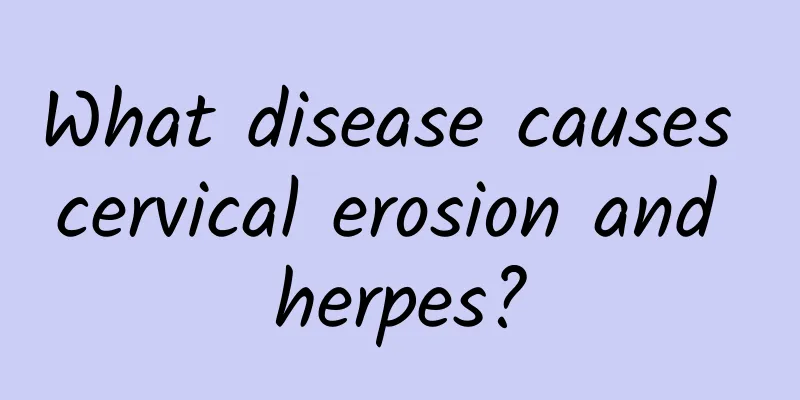What disease causes cervical erosion and herpes?

|
Cervical erosion with herpes is common in genital herpes infection, which is mainly caused by herpes simplex virus (HSV) infection. It is necessary to see a doctor as soon as possible for a clear diagnosis and receive standardized treatment. Possible causes include viral infection, physiological immunodeficiency, and sexual transmission. Treatment can include antiviral drugs, local treatment, and immune regulation adjuvant therapy. 1). Cause analysis (1) Viral infection Genital herpes is mainly caused by the herpes simplex virus HSV-2, and in a few cases, it may also be caused by HSV-1. The virus is transmitted through direct contact, especially unprotected sex. After the initial infection, the virus lurks in the ganglia and is prone to recurrence once the immune system decreases. At the same time, the virus may also cause local inflammation such as cervical erosion through the infected site. Countermeasures: Avoiding high-risk sexual behavior and using condoms can effectively block the spread of the virus; after infection, seek medical attention as soon as possible and confirm the diagnosis through virus testing. (2) Decreased immunity The simultaneous occurrence of cervical erosion and herpes is often related to a decline in the body's immunity. Excessive mental stress, lack of sleep or other chronic diseases can lead to immune dysfunction, making the virus more easily activated, thus causing symptoms to worsen. Countermeasures: It is crucial to enhance immunity. It is recommended to have a regular schedule, a balanced diet, and consume more foods rich in vitamin C and zinc such as oranges or nuts. If necessary, you can supplement with immune enhancers as recommended by a doctor. (3) Sexually transmitted diseases When genital herpes infection is accompanied by cervical erosion, it is necessary to check whether other sexually transmitted diseases such as gonorrhea, syphilis, HPV infection, etc. are present. These diseases may promote the spread of infection and induce or aggravate cervical damage. Countermeasures: Go to a regular hospital's gynecology or STD department for screening and treat the infection as soon as possible. Your sexual partner should also be examined at the same time to avoid cross infection. 2) Treatment methods (1) Drug treatment Antiviral drugs are the first choice for treating genital herpes, and commonly used drugs include acyclovir, valacyclovir and famciclovir. These drugs can control viral replication and relieve symptoms, especially when used in the early stages, they can effectively shorten the course of the disease. Usage: Follow the doctor's prescription, usually for a 7-10 day medication cycle. (2) Local treatment For cervical erosion, doctors may choose local anti-inflammatory drugs such as cortisone cream according to the degree of erosion. When cervical erosion is accompanied by obvious infection, physical therapy such as laser, freezing or microwave treatment may also be considered to promote healing. Note: Avoid sexual intercourse during treatment to prevent further irritation or worsening of infection. (3) Immunomodulatory therapy Recurrent herpes requires attention to immune regulation. Common methods include supplementing immune enhancers, such as transfer factors and other oral medications, or herpes vaccine injections for people with high recurrence rates, which can reduce the recurrence of the virus by enhancing immune response. Recommendation: Strengthening nutrition and exercise management is also an important part of immune regulation. 3). Prevention suggestions (1) Regular physical examinations: It is recommended to have a gynecological examination every year to detect and treat potential infections early. (2) Improving lifestyle habits: Quitting smoking, limiting alcohol consumption, and increasing exercise are the basis for improving immunity. (3) Personal hygiene: Avoid sharing personal items such as towels and bath towels, and keep private parts dry and clean. (4) Pay attention to mental health: Controlling stress and appropriately reducing psychological burden can avoid inducing fluctuations in immunity. Genital herpes infection is a common sexually transmitted disease. When it coexists with cervical erosion, it needs to be taken seriously. Effectively blocking transmission, improving immunity and cooperating with standardized treatment are the keys to controlling the disease. Once related symptoms are found, you should go to a regular hospital for examination and treatment in a timely manner. |
<<: How harmful is functional uterine bleeding to the body?
>>: How to treat if you are not pregnant after abortion
Recommend
How much does it cost to treat cervical precancerous lesions?
How much does it cost to treat cervical precancer...
How to completely cure bacterial vaginosis
In daily life, we should pay attention to bacteri...
Resist temptation! Fat man loses 60 kg in half a year
"The most important thing in the process of ...
What are the symptoms of premature ovarian failure?
Premature ovarian failure is a disease that affec...
Can women's adnexitis be cured?
Can adnexitis be cured in women? Adnexitis is a v...
Let's learn about the health care knowledge of ectopic pregnancy
Ectopic pregnancy is a common disease in life, an...
Ovarian cysts are a type of ovarian cyst that is caused by a small amount of ovarian fluid.
Many people know about ovarian cysts and know tha...
Love drinking bubble tea and gain weight! Female Chinese medicine practitioner Liao Wanrong lost 17 kg in half a year and shared her secret to not gaining weight again
Liao Wanrong, a Chinese medicine practitioner who...
What are the symptoms of uterine fibroids? How to identify uterine fibroids
The symptoms of uterine fibroids are not obvious ...
How to regulate irregular menstruation for young girls? 5 kinds of exercise can help you stay away from irregular menstruation
We all know that exercise is very beneficial for ...
What to do with ovarian cysts
Patients with ovarian cysts can improve their phy...
Radiation and chemotherapy for ovarian cysts
Like all gynecological diseases, the treatment of...
What are the symptoms of menopause? There are 4 aspects
Menopausal syndrome is a relatively common proble...
Which hospitals treat congenital absence of vagina?
Which hospitals can treat congenital absence of v...
Symptoms of vaginitis
Symptoms of vaginitis: Different types of vaginit...









